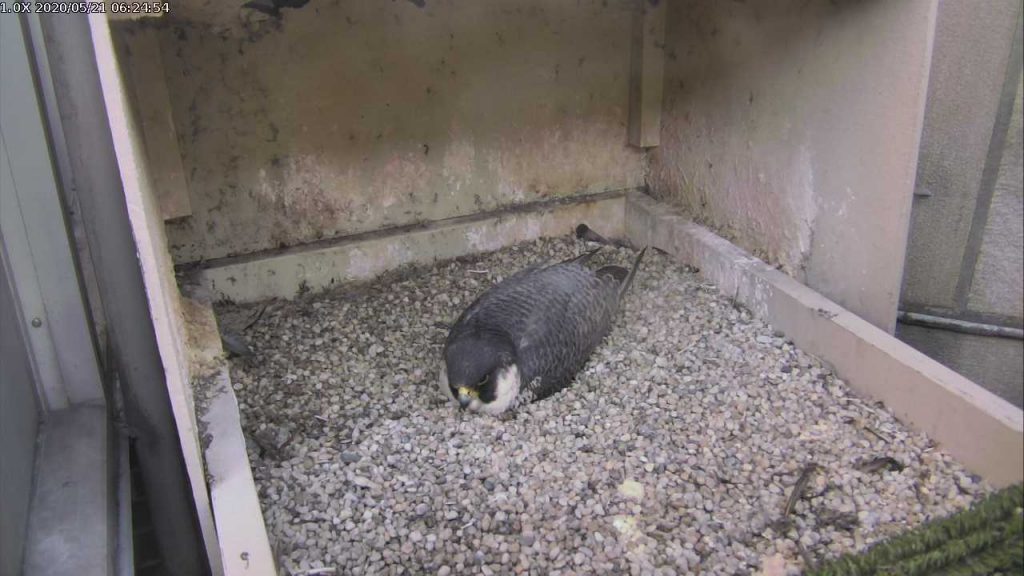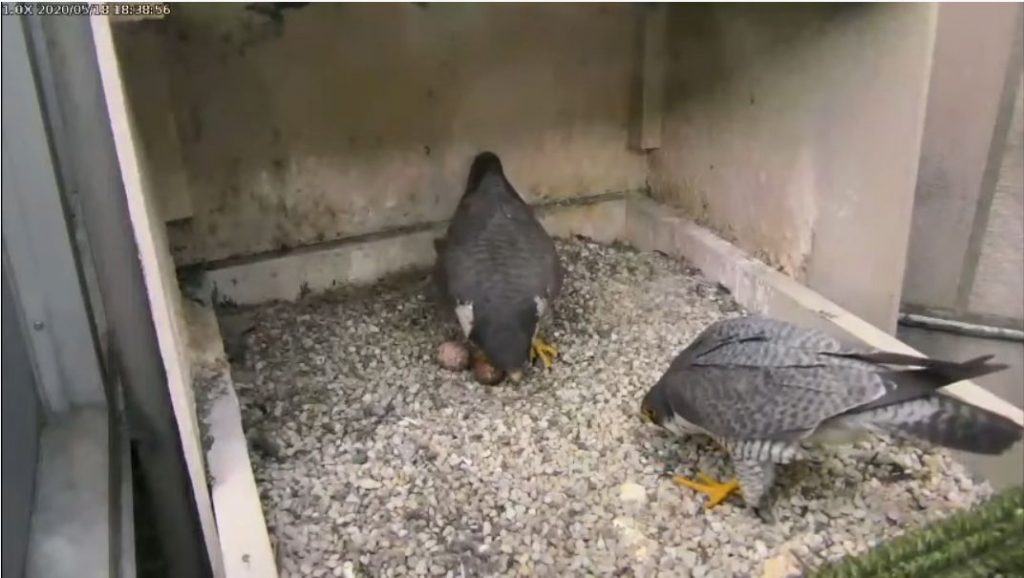
22 May 2020
Many who watch the Cathedral of Learning falconcam feel bad that Morela is incubating her eggs alone. Why isn’t one of her suitors, Terzo or Ecco, helping her incubate?
A clue comes from the answer to this question: What makes an an active raptor like a peregrine falcon want to stay immobile on eggs for more than a month?
Similar to us humans, the breeding season in birds is governed by hormones. Luteinizing hormones prompt testosterone production in males and progesterone (egg formation) in females. Then, as described in the Raptor Resource Project Blog …
Shortly before incubation, female birds (and male birds that share incubation duties) experience another big hormonal change. Prolactin, a hormone which promotes incubation in birds, rises sharply while other hormones decrease. Opioid peptides stimulate prolactin secretion, which may explain why even active birds become lethargic while incubating their eggs.
— What Makes Birds Incubate, Raptor Resource Project Blog
Morela is an active peregrine but after she laid her second egg her incubation hormones kicked in and she slowed way down. In this Day in a Minute video from 18 May 2020 you see her lying flat and often asleep on the eggs. Ecco arrived at 6:38pm, photo below.

Ecco sometimes approaches the eggs as if he’ll incubate but mostly he’s in courtship mode (see this 13 minute video). On Tuesday morning before dawn (19 May 2020) he came to the nest and greeted Morela. When she left he approached the eggs, but didn’t incubate.
It appears that Ecco knows what to do but is unable to begin. I suspect his incubation hormones have not kicked in.
Morela will stop incubating when her prolactin shuts off. Meanwhile she’ll spend time away from the eggs on a daily basis, “stretching her legs.” Without steady incubation the eggs won’t survive.
(photos and videos from the National Aviary falconcam at Univ. of Pittsburgh)
Thanks, Kate, and yes, it is hard to watch Morela’s efforts to incubate alone. Do you think that Ecco’s hormones failed to kick in because he wasn’t able to claim dominance over Terzo who always seemed to be flying overhead when Ecco was in the nest? It seemed Ecco was distracted and looking upward, so I am just assuming that Terzo was around. Sad season, for sure, but it’s nature’s way, I suppose.
I don’t know why his hormones didn’t kick in. For instance, it could be sunlight-related since Morela’s egg laying is 1-2 months late.
Thanks, Kate for this explanation. So if the eggs don’t hatch what will become of them?
Will they just be abandoned there until a human disposes of them? What will Morela do after the incubation period is over and no chicks appear? Nature can be strange and take unexpected turns.
Eventually Morela will give up on the eggs, perhaps move them to the side. They will wait until it’s time for us humans to do fall/winter nest & camera maintenance. Because of COVID restrictions and how unpredictable it’ll be next fall/winter I am not sure when that will be.
Interesting info.
Thanks to the aviary and Audubon I have seen pairs incubate. I know Male hummingbirds are “sperm donors”. Observed a bedraggled female Robin nesting on my windowsill.
I’m wondering if she has given up on incubation already. Every time I have checked today, there has been no bird in sight so no incubating.
Good observation, Luann. I think you’re right.
So sad, but a girl needs to eat and no one is helping her. I was so concerned that she would just die there on her eggs. We can hope that next year will be better
5:30 Who is tending the nest?
That’s Morela and she has an enormously full crop.
bad news. I have been checking the nest off and on this evening and Morela has not been on the eggs. she has been standing at the front of the box.